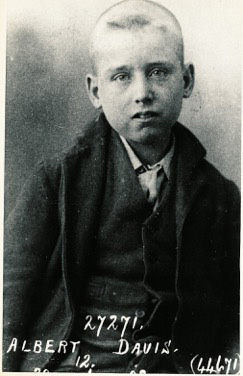Sobey Wall of Honour
Column
165
Row
20
Albert Joseph Samuel Davis was one of 85,000 child migrants who came to Canada from Britain in the late 19th and early 20th century. His story is a sad one, but typical of a time when family and child poverty and the lack of any social safety net combined to make it socially acceptable at that time to send children to countries of the empire to seek a new life.
Albert Davis was admitted to Dr. Barnardo's home on 1 July 1902 with his brother Fred Davis. He and his brother were found wandering in the streets of the East End of London by the police, who contacted the National Society for the Prevention of Cruelty to Children (NSPCC). The NSPCC took an action against their father, Samuel Davis, a coal porter, for neglect; Samuel was subsequently described in Barnardo's records as being 'very lazy', 'drunken', and 'a good-for-nothing fellow' who "hadn't worked for months", with no fixed abode, living in lodging houses. He was put on remand for a month, during which the NSPCC applied to Dr. Barnardo's on behalf of the children. Samuel consented to their admission, and they went to live in two separate Barnardo's homes in East London, near Stepney Causeway, almost opposite the Methodist Mission Church; Albert went to Leopold House, and Fred to Shepherd House.
Albert was born on the 10 March 1890 at Ponders End, Enfield, North London. Very little is known of his early life, but we do know that by the time of the 1901 census on 31 March, the family was living at 47 High Street, Bow, in east London, which would appear to signal a decline in their circumstances. By that time, the family also included his sisters Ellen and Ethel, both of whom worked at Bell's Match Factory in Bell Road, Bromley-by-Bow, and Albert's mother Florence Mary Davis, nee Downes, who died of consumption 4 months later on 31 July 1901, undoubtedly a factor in Samuel's circumstances.
This seemed to precipitate the decline and break-up of the family, so that a year later, when Fred and Albert were admitted to Barnardo's homes, the sisters were living separately in Washington Street.
Albert and Fred both sailed to Canada on 25 September 1902 on the S.S. Colonian, arriving on 6 October 1902 in Portland, Maine. There were 169 boys on the boat, and 133 girls. Just before they left, their father wrote to Barnardo's asking for their restoration to him, and objecting to their being sent abroad, but his consent for their admission to Barnardo's had included a special waiver which allowed for their emigration to Canada.
They travelled overland to Willetsholme, near Kingston, Ontario, and settled on farms, as was typical at that time. By January 1903, they were both in their new homes, and even featured in a paragraph in Barnardo's regular magazine, Ups and Downs:
The brothers, Albert and Freddie Davis, are near together, in the Township of Pittsburg [Ontario]. Little Freddie is, evidently, a great pet in his new home, while Albert is giving every possible satisfaction, and is under the care of kindly Christian people.
Albert led a varied and peripatetic existence in his first years in Canada, living on various different farms, all in the same area of eastern Ontario. However, the impression, from what we know, is that he never really settled in the way that his brother Fred did. For example, he enlisted in the Canadian Army in March 1916, leaving Halifax for Liverpool late in October 1916, although there is some mention of earlier service. He served in France, and made the return journey from Liverpool to Halifax in April 1919. After he came back, he apparently went back to farming and the cartage business in Gananoque, Ontario. There is no evidence that he maintained contact with Barnardo's, as did his brother Fred, although the brothers kept in touch. He pre-deceased Fred by about 10 months in July 1956.
